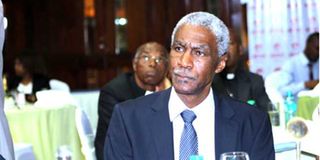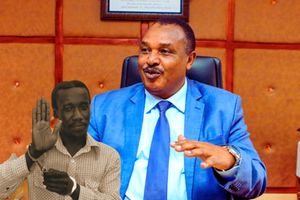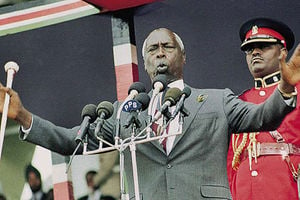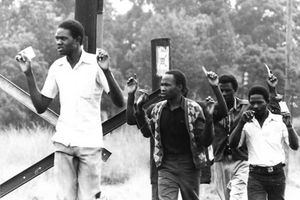
Former National Intelligence Director General Michael Gichangi Kibaki follows proceedings during the pre-Pope visit dinner at KICC on November 7, 2015.
Young Air Force pilot Michael Gichangi found himself among hostile army men at Lang’ata barracks on August 1, 1982, the day rebel Air Force soldiers staged an attempted coup. This is the untold story of his ordeal and subsequent rise to become Kenya’s spy chief.
Fighter jet pilot Michael Gichangi reported to 7KR Lang’ata Barracks to find out what was going on as rebel Air Force soldiers staged a coup that would change Kenya’s destiny on August 1, 1982.
Gichangi, who was based at the Nanyuki Airbase, had come to Nairobi over the weekend, only to be caught up in the chaos after the mutineers led by Private Hezekiah Ochuka attempted to topple President Daniel Moi’s government.
His friend, Captain Charles Munyeki Wachira, with the Kenya Army’s 50th Air Calvary Battalion (50 ACB), an airborne anti-tank battalion, had just landed from a mission to counter the insurgency.
At Lang’ata barracks, Army men were very hostile to Air Force soldiers, whom they considered the enemy given the putsch. They had rounded up some who had surrendered and they were being subjected to cruelty.
That is how Gichangi, who had risen through the ranks to become the first African pilot to fly F-5 planes in 1977, found himself in trouble.
“I saw Air Force soldiers being harassed in the evening. They (Army) were coming for Gichangi. But I defended him. He was my friend and he had done the right thing to come here to find out what was happening,” recounts Wachira, who was a squadron commander at the time, in an interview with the Nation.

RTD Major Munyeki Wachira gestures during the interview on July 30, 2024, when he spoke on the events that transpired during the attempted 1982 coup.
Gichangi, who was later promoted to a Major-General and in 2006 appointed by President Kibaki as National Security Intelligence Service (NSIS) director, corroborates Wachira’s account.
“I was an Air Force Officer. I can confirm that he was very instrumental in making sure that I was not harassed,” says the man who had joined Kenya Air Force (KAF) as a flight cadet in 1975 and had become an F-5 instructor in 1982.
“Maj Wachira has given you his story. It’s quite juicy, including how he threw the bombs into the Air Force base in Eastleigh,” says the pilot who succeeded Wilson Boinett as spy chief.
“And he came back and there I was in the military camp. I had reported there. He vouched for me and I was not harassed. People wanted to harass me. He stood very firm,” Gichangi recalls.
Wachira’s colleague, Joseph Muiruri, an army pilot, recalls that he found Gichangi at the officers’ mess at Lang’ata Barracks just around the time the 7th Battalion had arrived from Lodwar. The unit was tasked to capture KAF soldiers for interrogation at the barracks.
“At the time, the soldiers had been told the enemy was the Air Force because they had attempted to overthrow the government. As you would expect, they were mistreated,” explains Muiruri.
Gichangi, who retired as NSIS chief in September 2014, says he has a lot to tell about his time in KAF, events during the coup and its aftermath, stuff that he would want to write in his memoirs.
“It would make exciting reading; of that particular morning, of an Air Force officer in the middle of an Army camp when all this is going on ... But there is a much bigger story to be told. It is something that ideally should go into my memoirs but people who have done the kind of job I have done don’t write memoirs,” explains the former spy chief, alluding to the secrecy he is bound to after his tenure in the intelligence service.
“Very few people know about me before the big office,” says the man who left the military in 2004 to become the founding director of the National Counter-Terrorism Centre, from where he rose to NSIS chief.
“I spent many years in the Air Force. I flew the fighters in this country for over 20 years,” says the first Kenyan pilot to achieve 1,000 hours on the F-5 jet fighter. He later went to Sandhurst Military College in the United Kingdom, where he became the first African instructor for F5 planes in Africa.
“For me to end up where I was on that fateful day has a story in who I was as an Air Force pilot,” Gichangi explains, holding back perhaps on secrets that he has kept for the last 42 years. “There were serious consequences that need to be understood. A nice story people will enjoy,” he says, suggesting there is more to the 1982 abortive coup than has ever been told.
The man who graduated as the top foreign student in his class at Sandhurst, however, says he will open up about events of the fateful day at the right time.
“What I ended doing there (Lang’ata Barracks) after Wachira and my friend Khadija who has already passed on came to my rescue, is something I would want to tell at the right time,” he add.
In a past interview with the Nation, Gichangi had explained why he stayed on in KAF after the coup aborted. The service was renamed ‘82 Air Force and only reverted to KAF after 2010
“I got my commercial pilot license in 1981 while I was still in the Air Force. In 1982, after the attempted coup, I realised the Air Force had lost so many pilots. I decided to remain and train more fighter pilots to replace the ones we lost,” he said during the interview on the day he retired as NSIS boss.
Gichangi was at the centre of Kenya’s two darkest moments—the 1982 coup and the 2007 post-election violence when he served as intelligence boss.
The commission of inquiry chaired by Justice Phillip Waki that investigated the violence following President Kibaki’s controversial re-election, which was contested by his main challenger, Raila Odinga, observed that the NSIS had predicted the chaos in its intelligence reports.
“Of all the State security agencies, the NSIS was, it seems, with the possible exception of the military, best prepared. Evidence was received to the effect that not only did the Service gather information and data about what could potentially occur around the 2007 elections in terms of violence, but developed a range of reports highlighting the issues and provided them to senior government officials as well as the police, military, prisons and other agencies,” the commission stated in the report.
It added: “The Commission heard and was provided with supporting evidence that the Service was in fact uncannily accurate in its forecasting of just what scenarios were likely to eventuate should either Odinga or Kibaki win the presidential elections. The scenarios predicting possible 2007 election outcomes and consequences sounded a clear warning that security organs may well be overwhelmed by the high intensity and widespread nature of ensuing lawlessness.”
The then Chief of General Staff General Jeremiah Kianga testified that the military not only heeded the NSIS reports, but conducted their own assessments, scanning and planning arrangements based upon their view that the 2007 elections would see a level of violence to, at least, levels seen at previous elections.
The commission observed that the intelligence agency had warned of the real potential for security organs to be overwhelmed by “widespread lawlessness” and pointed to challenges that would undermine a response, including lack of collaboration between police units and a partisan public service.
The NSIS, the commission further noted, produced both regular and special reports including hotspots updates, situation reports, weekly and fortnightly reports and briefs, security briefs at a provincial and district level as well as National Security Advisory Committee (NSAC) reports regularly throughout the months leading up to the General Election.
“As early as September 2007, these reports warned of impending election related violence in clearly specified areas and provided a continuing alert process through updated assessments of potential PEV,” the report states.
“In many instances, these documents identified various individuals suspected of being involved in such activities as inciting, planning disruption and violence, threatening behaviour and other offences,” it added.
The service went as far as recommending that operational agencies prepare specific contingency plans, take special and decisive action against inciters and financiers of criminal gangs, and ensure staff refrain from partisan behaviour.
A special report titled Critical Dates and Events – General Elections 2007, was forwarded on December 6 to Mr Samuel Kivuitu, then the chairman of the Electoral Commission of Kenya, the contents of which had been presented to the NSAC.
The letter warned of “increased political activity and attendant lawlessness are likely to overwhelm the security organs”, among other things.
A further report dated December 7 addressed to Kivuitu and copied to then Secretary to the Cabinet and Head of the Public Service Francis Muthaura , and the Commissioner of Police, warned further of issues likely to inflame an already volatile situation, including “persisting claims of election irregularities ... formation of anti-rigging squads by parties, and hiring and use of criminal gangs against opponents and persisting ethnic clashes/animosities in some parts of the country due to inflammatory political utterances”.
In another letter dated December 24, 2007, Gichangi provided survey results indicating the relative position of the three presidential candidates in the polls. He also included an assessment as to the final results on December 27, 2007.
“The consistent message, frequently communicated by the NSIS, around the need for state organs and their officers to be neutral during the elections seemed farcical in the face of these revelations,” the Waki commission observed.
“Given the extensiveness of the intelligence developed and distributed by the service, it was disturbing to note that in the end, there was an almost fatalistic realisation that no or insufficient preventive action would be taken to ameliorate the mayhem,” it concluded.
The commission did, however, have grave reservations about the involvement, and attempted involvement, of the NSIS in the elections process.
This involvement was manifested in three specific instances. One concerned an attempt by the NSIS Regional Intelligence Coordinator, Nairobi Region to secure ECK 50 accreditation badges for his officers.








